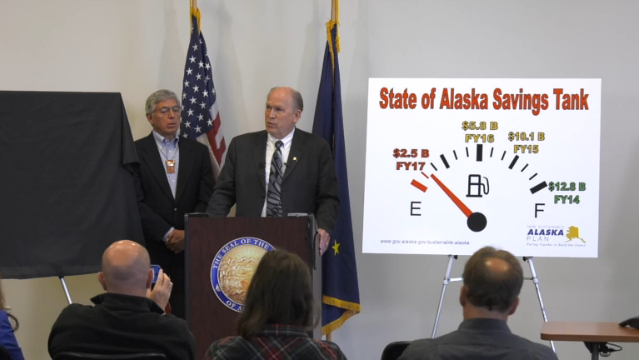Alaskans are already starting to feel the effects of state budget cuts, from shorter court hours to last minute local budget negotiations.

Friday afternoons used to be busy times for court-appointed advocates for But not anymore. Starting on July 1st, state courts began closing on Fridays at noon to save money.
Margie McWilliams is an advocate who works in Juneau.
“It impacts the children I advocate for, just because they’re children, and it slows down the resolution of issues in their cases,” McWilliams said. “So, from my perspective, it’s really making a difficult problem even worse.”
McWilliams’ clients are among those impacted by the more than $800 million dollars in cuts to the state operating budget. But they aren’t the only ones.
Department of Corrections employees and inmates will be reshuffled when one of the facilities closes.
Drivers could be in for rough times when some Department of Transportation maintenance stations are shuttered, delaying repairs and causing roads to deteriorate faster. Live near a low-traffic road? Those might be impassable for several days if there are back-to-back snow storms.
And Walker’s vetoes reduced the Child Support Services Division by a half million dollars, so the Division will close its Juneau and Wasilla field offices.
State fiscal policy analyst Brian Fechter said this is similar to other cuts that reduce the number of staff positions and thus government’s available to provide services.
“A lot of it just goes back to longer lines and greater backlogs,” Fechter said. “For instance, the Child Support Services veto – that’s less capacity in their Division – potentially, longer wait times for any services they provide to people.”
On the bright side, the budget cuts aren’t expected to lead to many pink slips for state workers. While state officials project that the budget will lead to 309 fewer positions, Fechter said the number of layoffs will be much lower.
“It’s our philosophy to avoid a pink-slip layoff wherever possible,” Fechter said.
Instead, the Walker administration will aim to leave vacant positions unfilled and give those workers whose positions are eliminated enough notice for them to find new jobs.
But that’s just state government jobs. The cuts will also ripple through Alaska’s economy. A study by the University of Alaska Anchorage’s Institute of Social and Economic Research says 235 million in cuts to state agency budgets could cost – directly and indirectly — more than two thousand jobs statewide. Add in Walker’s veto of half the money for the Permanent Fund Dividend, and more than four thousand jobs could be lost.
But study author, economist Gunnar Knapp, said pointing out the negative consequences of the dividend reductions and budget cuts isn’t enough. Knapp says critics of the cuts must consider the alternatives.
“The question is not, ‘What don’t you like?’” Knapp said. “The question is, ‘Well, what would you do?’ And that is the discussion we’re eventually going to have to get to.”
That’s the discussion the Legislature is supposed to have during the newest special session this month. They’ll be considering new tax packages and other ways to pay for state government. But in the meantime, local governments are scrambling to figure out their own unexpected budget gaps caused by the state budget cuts.
Matanuska Susitna Borough Mayor Vern Halter says the loss of more than 5 million dollars in state school debt reimbursement will be a challenge to make up.
“I am totally disappointed in Juneau, period. They cannot seem to do their business in a good fashion,” Halter said. “And then pass it on to municipalities and boroughs, is what they’re doing.”
Mat-Su isn’t the only borough struggling with this question. Communities across the state are trying to figure out how to cover the 30 million dollars in school debt reimbursement they no longer have covered.
Andrew Kitchenman is the state government and politics reporter for Alaska Public Media and KTOO in Juneau. Reach him at akitchenman@alaskapublic.org.




